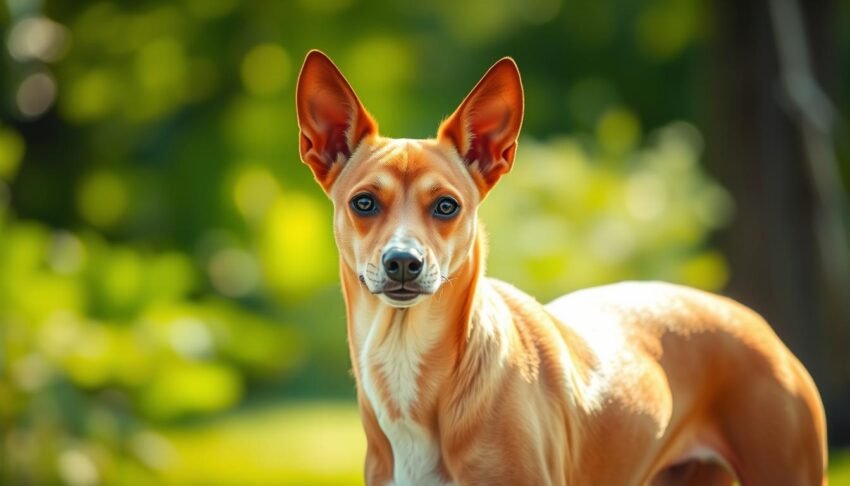The Basenji, an African dog breed, is known for its unique characteristics and history, with the breed being one of the oldest dog breeds, confirmed as the second oldest known breed in existence today, with only the dingo being older1. You may be interested in learning more about this breed, including its history, characteristics, and care requirements, as the Basenji is believed to be one of the oldest dog breeds, with origins dating back thousands of years, suggesting a history that spans over 5,000 years2. The Basenji is known as the “barkless dog,” a unique characteristic among dog breeds, and originates from Central Africa, where it has been used by hunters for tracking and flushing game3.
As you explore the world of Basenjis, you will discover that they have a unique vocal structure that produces a yodel-like sound, rather than a bark, due to their specially shaped larynx1, and they communicate primarily through a unique sound called a “yodel” or “baroo” instead of barking3. The breed’s compact size and low grooming needs have made it increasingly popular as a companion animal, with ownership rates rising by roughly 15% over the past decade2.
Key Takeaways
- The Basenji is an ancient African dog breed with a unique barkless trait.
- Basenjis have a specially shaped larynx that produces a yodel-like sound instead of a bark1.
- The breed originates from Central Africa and has been used for tracking and flushing game3.
- Basenjis require regular exercise and mental stimulation, with at least 60 minutes of exercise daily2.
- The breed’s compact size and low grooming needs make it a popular companion animal.
- Basenjis are known for being independent and have a strong prey drive, which can necessitate extensive training and socialization32.
Origin and History of the Basenji
The Basenji, a small hunting dog known for being a barkless dog, has a rich and fascinating history that spans thousands of years4. Originating in Africa, this breed was highly valued for its intelligence, adaptability, and unique characteristics, making it an essential part of various African tribes4. The Basenji’s role in these tribes was not only limited to hunting small game but also as a companion and guardian5.
One of the earliest recorded introductions of the Basenji to the Western world was in 1843 when a captain gifted an “African dog” to Queen Victoria, marking the breed’s introduction outside of Africa5. However, it wasn’t until the late 1930s that the breed was established in the U.K., amidst challenges with vaccination losses among early breeders5. The Basenji’s journey to the Western world was gradual, with the breed gaining popularity in the 1950s after being featured in the film “The African Queen” and the book “Good-bye, My Lady”5.
Here are some key points about the Basenji’s history:
- Originated in Africa thousands of years ago4
- Valued for its intelligence, adaptability, and unique characteristics4
- Introduced to the Western world in 18435
- Established in the U.K. in the late 1930s5
As a small hunting dog, the Basenji’s history is a testament to its strength and resilience, making it a beloved breed among dog enthusiasts6. With its unique characteristics and rich history, the Basenji is a breed that continues to fascinate and captivate people around the world4.
| Year | Event |
|---|---|
| 1843 | Introduction to the Western world |
| 1930s | Establishment in the U.K. |
| 1950s | Featured in “The African Queen” and “Good-bye, My Lady” |
Unique Barkless Trait of the Basenji
The Basenji’s unique barkless trait is one of its most distinctive features, making it an Independent breed that stands out from other dogs. This trait is due to the shape of the Basenji’s larynx, which is different from other breeds7. As an Intelligent canine, the Basenji has developed alternative ways to communicate, such as the “barroo” sound, which is a unique yodeling howl8.
Some common misconceptions about the Basenji’s communication include the idea that they are unable to make any noise at all. However, this is not the case, as they are capable of producing a range of sounds, including the “barroo” and other vocalizations9. To understand the Basenji’s communication style, it’s essential to recognize their Independent breed nature and Intelligent canine characteristics.
Here are some key facts about the Basenji’s unique barkless trait:
- The Basenji’s larynx is shaped differently, allowing it to produce a unique sound instead of a bark7.
- The “barroo” sound is a unique yodeling howl that the Basenji uses to communicate8.
- Basenjis are capable of producing a range of sounds, including the “barroo” and other vocalizations9.
Physical Characteristics of the Basenji
The Basenji is a small to medium-sized dog with a short, smooth coat that requires minimal grooming, making it a great choice for those with allergies, as it is considered a Hypoallergenic dog10. This Ancient dog breed has a distinctive appearance, with a height range of 16 to 17 inches and a weight range of 20 to 24 pounds11. The Basenji’s coat comes in a variety of colors, including chestnut red, black, tricolor, and brindle, with a short length that requires minimal maintenance12.
The breed’s physical characteristics are not only visually appealing but also functional. Their short coat requires minimal grooming, making them a great choice for busy owners10. The Basenji’s small size and short coat also make them a great choice for those who live in small spaces, as they do not require a lot of room to run around. However, they do require regular exercise to stay happy and healthy, with at least 1 hour of vigorous exercise per day12.
Some key characteristics of the Basenji include:
- Height: 16 to 17 inches10
- Weight: 20 to 24 pounds11
- Coat length: Short12
- Coat colors: Chestnut red, black, tricolor, and brindle10
Overall, the Basenji’s physical characteristics make it a unique and appealing breed, with its short coat and small size making it a great choice for those who want a low-maintenance pet11. As an Ancient dog breed and a Hypoallergenic dog, the Basenji is a great choice for those who want a breed with a rich history and minimal shedding10.
Temperament and Personality

As an Intelligent canine, the Basenji is known for its unique temperament and personality. With a playful and curious nature, Basenjis make great companions for active families. They are recognized for their independence and alertness, which can sometimes be misinterpreted as being aloof13. However, with proper socialization and training, Basenjis can become loving and loyal members of the family.
One of the key characteristics of the Basenji is its high energy level, requiring at least 30 minutes of exercise per day13. This can include walks, runs, and playtime in the yard. With their high exercise needs, Basenjis are best suited for families who have an active lifestyle. Additionally, their minimal grooming needs make them a great choice for busy families13.
When it comes to family dynamics, Basenjis can be a great addition to families with children. They are generally medium in terms of affection level, friendliness, and kid-friendliness14. With proper training and socialization, Basenjis can learn to interact well with children and other pets. It’s essential to note that Basenjis can be prone to certain health issues, such as hip dysplasia and kidney problems, which require regular veterinary check-ups13.
In terms of trainability, Basenjis are known to be challenging to train due to their independent nature14. Consistent training and positive reinforcement techniques can help to overcome this challenge. With patience and dedication, Basenjis can learn to obey commands and become well-behaved members of the family. As an Intelligent canine, the Basenji requires a committed owner who can provide the necessary attention, exercise, and training15.
Training a Basenji
As a small hunting dog, the Basenji requires careful training to become a well-behaved and well-adjusted companion. One of the key challenges in training a Basenji is its independent nature, which can make it resistant to traditional training methods16. However, with positive reinforcement techniques, you can develop a strong bond with your Basenji and encourage good behavior.
Positive reinforcement is a powerful tool in training a Barkless dog like the Basenji. By focusing on rewards and praise, you can encourage your Basenji to respond to commands and behave well in various situations16. Socialization is also crucial in training a Basenji, as it helps your dog become confident and calm in the presence of people and other animals.
Challenges in Training
Training a Basenji can be challenging due to its independent streak and strong will. Nevertheless, with patience, consistency, and positive reinforcement, you can overcome these challenges and develop a strong, loving relationship with your Basenji16.
Positive Reinforcement Techniques
Positive reinforcement techniques are essential in training a Basenji. These techniques include reward-based training, clicker training, and praise-based training16. By using these techniques, you can encourage good behavior and develop a strong bond with your Basenji.
Remember, training a Basenji requires time, patience, and effort. With the right approach and techniques, you can develop a well-behaved and well-adjusted Basenji that brings joy and companionship to your life16.
Health Considerations for Basenjis
As an owner of a Basenji, an Ancient dog breed, you should be aware of the potential health issues that can affect your pet. Basenjis are generally healthy, but like all breeds, they can be prone to certain health problems. One of the common health issues in Basenjis is Fanconi syndrome, a genetic disease that can lead to kidney failure17. Regular veterinary check-ups are essential to monitor your Basenji’s health and detect any potential issues early on.
Some of the key health considerations for Basenjis include:
- Fanconi syndrome: a genetic disease that can lead to kidney failure17
- Hip dysplasia: a condition that can cause arthritis and mobility issues18
- Eye problems: such as progressive retinal atrophy, which can lead to vision loss18
Despite these potential health issues, Basenjis can make great pets for people with allergies, as they are considered a Hypoallergenic dog breed. With proper care and regular veterinary check-ups, Basenjis can live a long and healthy life, with an average lifespan of 13-14 years18.
| Health Issue | Description | Prevalence |
|---|---|---|
| Fanconi syndrome | A genetic disease that can lead to kidney failure | Approximately 7% of all Basenjis17 |
| Hip dysplasia | A condition that can cause arthritis and mobility issues | Unknown, but regular check-ups are recommended18 |
Basenji Care and Maintenance
As an owner of a Basenji, an African dog breed, you need to understand the importance of proper care and maintenance to ensure your pet leads a happy and healthy life. Basenjis have low grooming needs, but they require regular exercise and a balanced diet19. Regular exercise is crucial for their physical and mental health, and a balanced diet will help maintain their overall well-being.
Here are some key aspects of Basenji care and maintenance:
- Grooming: Basenjis have a short, smooth coat that requires occasional brushing and bathing20.
- Exercise: Basenjis need approximately 60-90 minutes of exercise per day, which can include walks, runs, and playtime19.
- Diet: A balanced diet is essential for Basenjis, and owners should focus on providing high-quality food that meets their nutritional needs20.
By following these guidelines and providing proper care and maintenance, you can help your Basenji lead a long and healthy life, with an average lifespan of 13-14 years20.
Grooming Needs
Basenjis have a low-maintenance coat, but they still require regular grooming to stay clean and healthy. This includes occasional brushing and bathing, as well as nail trimming and ear cleaning20.
Exercise Requirements
Regular exercise is essential for Basenjis, and owners should aim to provide at least 60-90 minutes of exercise per day19. This can include walks, runs, and playtime, and can help keep your Basenji happy and healthy.
Nutrition and Diet Guidelines
A balanced diet is crucial for Basenjis, and owners should focus on providing high-quality food that meets their nutritional needs20. This can include a mix of protein, fat, and carbohydrates, as well as essential vitamins and minerals.
Living with a Basenji

As an Independent breed, Basenjis require a specific type of living situation that caters to their unique needs. They thrive in homes with space to exercise, allowing them to express their natural energy and curiosity21. With proper care and attention, Basenjis can adapt to various living situations, making them a great companion for active families or individuals.
As an Intelligent canine, Basenjis are known for their problem-solving skills and independent nature. They require consistent training and socialization to ensure they interact well with other pets and family members22. With patience and positive reinforcement, Basenjis can learn to coexist with other animals and become a loving and loyal companion.
When considering a Basenji as a pet, it’s essential to think about the ideal family environment and compatibility with other pets. Here are some factors to consider:
- Space: Basenjis need room to exercise and play, so a spacious home or yard is essential.
- Training: Consistent training and socialization are crucial to ensure Basenjis interact well with other pets and family members.
- Attention: Basenjis require attention and interaction from their owners, so a busy household may not be the best fit.
By understanding the needs of an Independent breed like the Basenji and providing the right care and attention, you can create a happy and harmonious home for your Intelligent canine companion2122.
| Factor | Consideration |
|---|---|
| Space | Spacious home or yard |
| Training | Consistent training and socialization |
| Attention | Regular interaction and attention from owners |
Fun Facts About Basenjis
As a Small hunting dog, the Basenji has a rich history and unique characteristics that set it apart from other breeds. One of the most interesting facts about Basenjis is their inability to bark, earning them the nickname Barkless dog23. Instead, they make a unique yodeling sound, which is often described as a cross between a howl and a bark24.
Basenjis have been featured in various forms of media, including films and television shows, where they are often portrayed as intelligent and resourceful animals23. In mythology and folklore, Basenjis are often associated with ancient cultures, such as the Egyptians and the Congolese24. Their historical significance is evident in their depiction in ancient artifacts and artwork, showcasing their importance as a hunting breed23.
Some interesting facts about Basenjis include:
- They are known for their intelligence, courage, and adaptability, making them skilled hunting dogs23.
- Basenjis are capable of jumping high and running fast, with some individuals reaching speeds of up to 25 miles per hour24.
- They are prone to bonding closely with one or two family members, exhibiting a marked preference for independence23.
Overall, the Basenji is a fascinating breed with a unique history and characteristics that make it an interesting subject to learn about23. Whether you’re a seasoned dog owner or just a dog enthusiast, the Basenji is sure to capture your attention with its intelligence, agility, and affectionate nature24.
| Characteristics | Description |
|---|---|
| Size | Small to medium-sized dog |
| Coat | Short, smooth coat that requires minimal grooming |
| Temperament | Intelligent, curious, and independent |
The Role of Basenjis in Sports and Activities
As an Ancient dog breed, Basenjis are naturally agile and enjoy activities that challenge them physically and mentally. They are considered a Hypoallergenic dog breed, making them a great choice for owners with allergies. With their high stamina and strong prey drive25, Basenjis are well-suited for dog sports such as lure coursing and agility training26.
Some engaging activities to try with your Basenji include:
- Lure coursing: a fun and challenging activity that allows your Basenji to chase a lure in a secure environment26
- Agility training: a great way to improve your Basenji’s obedience and physical fitness25
- Tracking: a mentally stimulating activity that challenges your Basenji to follow a scent26
Remember to always provide your Basenji with proper exercise and training, including daily walks and leash training25. With their strong instinct to chase moving objects, it’s essential to use a proper harness, such as the Easy Walk harness, to prevent injuries or escapes during walks25.
Adopting a Basenji
As you consider bringing a Basenji, an African dog breed, into your family, it’s essential to understand the adoption process and what to expect. Basenjis can be adopted from breed-specific rescues or shelters, where they receive complete veterinary care, including DNA testing for Fanconi syndrome27. This care is crucial to their health, and adoption fees often do not cover the extensive medical treatments required for Basenjis in rescue27.
To prepare your home for a Basenji, consider their unique needs, such as exercise and training requirements. Basenjis are clever, stubborn, independent, and reserved, and they require an owner with some dog ownership experience28. They are known for their vocalizations, including yodels, howls, shrieks, and a “fox bark,” but they do not bark like most dogs28.
Here are some key things to consider when adopting a Basenji:
- Research breed-specific rescues and shelters
- Understand the adoption process and fees
- Prepare your home for a Basenji’s unique needs
- Consider your lifestyle and experience with dogs
By understanding the adoption process and what to expect, you can make an informed decision and ensure a smooth transition for both you and your new Basenji. Remember to research and prepare your home for a Basenji’s unique needs, and consider your lifestyle and experience with dogs28.
Conclusion: Is a Basenji the Right Breed for You?
As you’ve discovered, the Basenji is a truly unique and fascinating breed. With their independent spirit, barkless communication, and energetic nature, they require a special kind of owner who can provide the care and understanding they need29.
To determine if a Basenji is the right fit for your lifestyle, consider your level of patience, experience with training, and ability to meet their exercise requirements30. Basenjis thrive in homes where they can receive ample attention, mental stimulation, and the opportunity to explore and play.
If you’re prepared to take on the challenges and rewards of owning an like the Basenji, and you’re confident in your ability to provide for their needs, then this breed may be the perfect addition to your family. Reach out to local Basenji rescues or breeders to learn more and start your journey with this unique companion.
FAQ
What is a Basenji?
What are the origins of the Basenji?
Why are Basenjis considered “barkless” dogs?
What are the physical characteristics of a Basenji?
What is the temperament of a Basenji?
What are the challenges in training a Basenji?
What health considerations should Basenji owners be aware of?
How much care and maintenance do Basenjis require?
What are the ideal living conditions for a Basenji?
Where can I find a Basenji for adoption?
Source Links
- Basenji 101: 12 Intriguing Facts About Africa’s Barkless Dog | PetMojo – https://www.petmojo.com/basenji-facts-about-africa-barkless-dog/
- The Basenji: An Ancient and Unique Hunting Dog – https://vocal.media/education/the-basenji-an-ancient-and-unique-hunting-dog
- Basenji: Did you know there is only one barkless dog in the world? – https://medium.com/@vignesh_2710/basenji-did-you-know-there-is-only-one-barkless-dog-in-the-world-b667d42435cb
- Basenji Timeline – https://www.basenji.org/index.php/about-basenjis/history-of-basenji
- No title found – https://www.akc.org/expert-advice/dog-breeds/basenji-history/
- Basenji – https://en.wikipedia.org/wiki/Basenji
- Barkless Dogs: Basenji’s Characteristics, History, and More – https://basepaws.com/blog/barkless-dogs-basenji-dog
- The Basenji: The Barkless Dog with a Rich History – https://www.zealandiapets.com/pages/the-basenji-the-barkless-dog-with-a-rich-history?srsltid=AfmBOooemYnC_ZXIlvXBv5e2ln_S5EYpcvk8Eo2xEPdXlSElQButmySM
- Basenji: Traits, Health, Diet and Care – https://tibetandogchew.com/pages/breeds/basenjis
- Basenji – https://www.dailypaws.com/dogs-puppies/dog-breeds/basenji
- The Basenji: The Barkless Dog with a Rich History – https://www.zealandiapets.com/pages/the-basenji-the-barkless-dog-with-a-rich-history?srsltid=AfmBOoqY-kB7z-pphHAyBK8_J42Fr-amrZ2oQynfbg8RggcX-BeHyA6y
- Basenji: Your Complete Guide – https://dogacademy.org/breeds/basenji
- Basenji – https://dogtime.com/dog-breeds/basenji
- Learn About the Quiet and Catlike Basenji – https://www.thesprucepets.com/basenji-dog-breed-profile-1117936
- Basenji Personality – https://basenjiforums.com/topic/14944/basenji-personality
- Training Help | Mwimbaji Basenjis – https://www.utahbasenji.com/copy-of-about-us
- Basenji Health Information – https://www.basenji.org/PUBLIC/BasenjiHealthPages.pdf
- Basenji – https://www.petmd.com/dog/breeds/basenji
- Basenji – https://www.pdsa.org.uk/pet-help-and-advice/looking-after-your-pet/puppies-dogs/medium-dogs/basenji
- Basenji Dog Breed: Info, Pictures, Care, & Facts – Dogster – https://www.dogster.com/dog-breeds/basenji
- Basenji as a Family Dog — Basenji Club of Northern California – https://bconc.org/basenji-as-a-family-dog
- Good Bad and Ugly Basenjis – https://www.basenjirescue.org/REALITY STORIES/Good-Bad-Ugly.asp
- No title found – https://www.akc.org/expert-advice/lifestyle/fun-facts-basenji/
- 10 Super-Smart Facts About Basenjis – https://www.mentalfloss.com/article/71941/10-super-smart-facts-about-basenjis
- Basenjis: An Athlete’s Best Friend | PetMojo – https://www.petmojo.com/basenjis-athletes-best-friend/
- Basenji Sports | Basenji Breed Network – https://www.basenjibreednetwork.org.au/?page_id=86
- Basenji Rescue and Transport – https://www.basenjirescue.org/
- Basenji Dog Breed & Adoption Information – https://www.petfinder.com/dogs-and-puppies/breeds/basenji/
- The Basenji Coloring Vs Personality? – https://basenjiforums.com/topic/9937/the-basenji-coloring-vs-personality
- Basenji – Sidewalk Dog – https://www.sidewalkdog.com/basenji/


